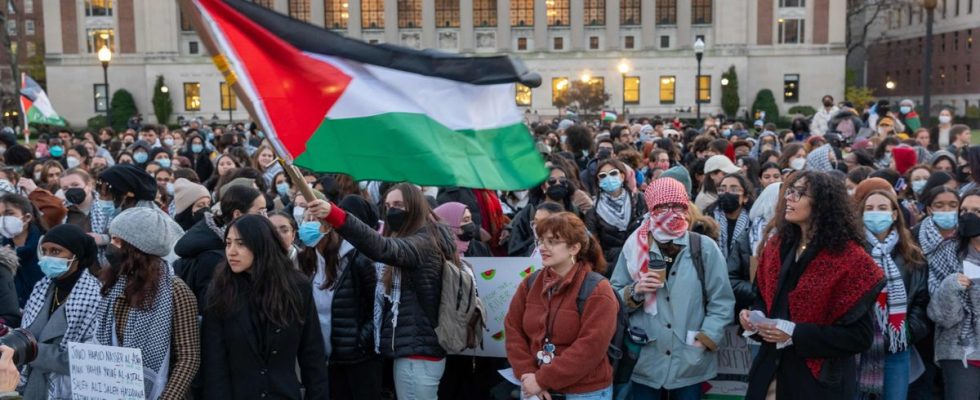In America, “free speech” is king. The First Amendment to the Constitution prohibits the government from “limiting freedom of expression” by law. But if elected officials and the courts generally defend this sacrosanct principle, the war between Hamas and Israel is putting it to the test. The largest American universities are accused of not sufficiently combating anti-Semitism, while thousands of students have regularly demonstrated, since the attacks of October 7, in favor of the Palestinian cause, sometimes calling for an “intifada”. (Arabic term meaning “uprising”) against the “Israeli occupier”.
After a criticized congressional hearing, University of Pennsylvania President Elizabeth Magill resigned. On the other hand, the boss of Harvard, Claudine Gay, saved her head. Erwin Chemerinsky, dean of the law faculty at the University of Berkeley and co-author of the book Free Speech on Campus (2017), insists: in the United States, “an opinion, no matter how offensive, cannot be prohibited.”
The defense of freedom of expression seems almost absolute in the United States. Why did the founding fathers make this choice?
Because they had enormous distrust of the government. The idea was to not give him the power to decide what is true or false. There was also a feeling that free speech is a pillar of democracy, and that it is better to let all ideas be expressed rather than giving the government the power to decide which ones to censor.
In France, individual freedom of expression is balanced by the protection of the community and individuals, with limits to combat racism, anti-Semitism or homophobia. Is this the case in the United States?
In the United States, there is a strong presumption that all speech is protected, subject to exceptions. Unlike European countries, there are no exceptions for hate speech. Anti-Semitic or Islamophobic remarks are generally protected by the First Amendment. The main exceptions are in cases of incitement to illegal activity, harassment, or what is called a ‘real threat’. But if someone wants to take to the streets and say: ‘Death to Jews or Muslims,’ he has the right to do so.
Even in the case of negationism, what if an elected official contested the reality of the gas chambers or the Holocaust?
This would be protected speech under the First Amendment. This would be reprehensible and immediately denounced and refuted. But the person could not be punished for saying that. There would be no criminal or civil liability.
In France, pro-Palestine gatherings have been banned due to a “risk of disturbing public order”. Is this possible in the United States?
Yes, in two circumstances. For example if the speaker incites illegal activity. The test for incitement is that the speech must be likely – or intended – to provoke imminent illegal activity. The other is a situation where there could be an angry crowd reaction with no other means of ensuring safety than a ban. But this must be a last resort.
An opinion, no matter how offensive, cannot be banned
Do universities have the right to place stricter limits on freedom of expression in their code of conduct?
The First Amendment to the Constitution only concerns the federal state. It therefore applies to public universities like Berkeley, but not to private establishments like Stanford, which are not obliged to uphold the principles of freedom of expression. However, most choose to do so.
Have there been any attempts to combat hatred?
In the 1990s, 360 universities [publiques, sauf une] have adopted a code against hate speech. All those examined by the courts, without exception, have been deemed unconstitutional, in the name of the First Amendment.
A Republican lawmaker recently asked Harvard President Claudine Gay whether calls for Jewish genocide or an intifada violated the university’s code of conduct. Claudine Gay was criticized for answering “It depends.” Is she right?
I repeat but it is important: Harvard, a private university, does not have to respect the First Amendment but chooses to do so. She [Claudine Gay] is absolutely right, it’s the law. A person has the right to express an opinion in favor of genocide. This does not mean that it cannot be punished criminally if it rises to the level of incitement, threat or harassment. But under the First Amendment, the government cannot prohibit the idea of genocide or its expression.
Is there a distinction between general violent rhetoric, such as slogans calling for an intifada, and targeted threats?
Pro-Palestine student groups have absolutely the right to chant these slogans on campus as part of a demonstration. But if they repeat it, for example, in front of a kosher university restaurant, it can become harassment, or a threat if they surround a Jewish student. But an opinion, no matter how offensive, cannot be banned. The circumstances in which it is expressed can, however, be punished.
You yourself are of Jewish faith. How can university leaders find a compromise between protecting free speech and combating anti-Semitism?
There are things universities can do rather than limit free speech. Administrators can condemn anti-Semitism. They can offer awareness and training programs, and offer support to Jewish students and staff.
What should we do when Jewish students say they don’t feel safe?
You have to exercise discernment. Today, when my students are shocked or offended, they immediately say, “I don’t feel safe.” Our first responsibility on campus is to do everything we can to protect the physical safety of students and their right to express diverse ideas and opinions.
But it is not the role of the university to protect students who feel threatened by ideas that offend them, even deeply.

